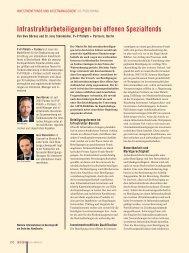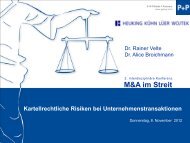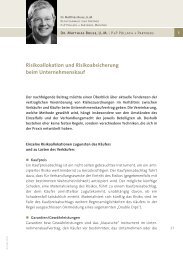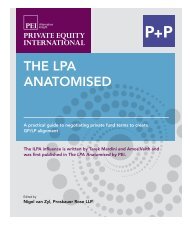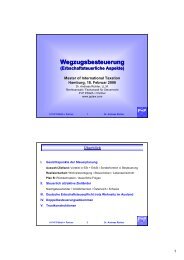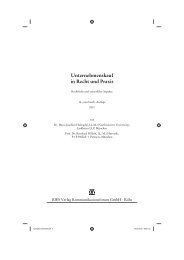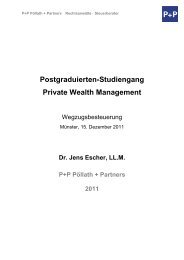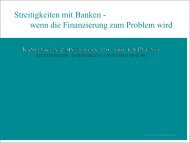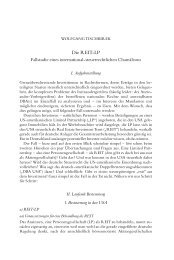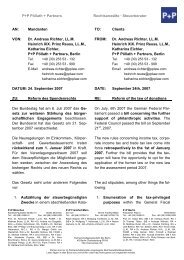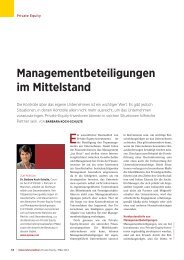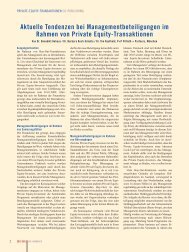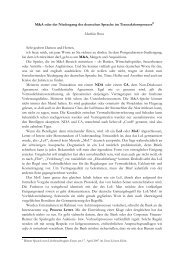Investissements étrangers en Allemagne Foreign Investments in ...
Investissements étrangers en Allemagne Foreign Investments in ...
Investissements étrangers en Allemagne Foreign Investments in ...
Create successful ePaper yourself
Turn your PDF publications into a flip-book with our unique Google optimized e-Paper software.
F<strong>in</strong>ancem<strong>en</strong>t d’acquisition dupo<strong>in</strong>t de vue<br />
allemand<br />
droit de distribuer d’actifs à ses actionnaires, à<br />
mo<strong>in</strong>s que ce ne soit une distribution régulière ou<br />
que l’AG et ses actionnaires n’ai<strong>en</strong>t conclu un<br />
accord de dom<strong>in</strong>ation de pertes et profits. En<br />
d’autres termes, lorsque l’AG accorde une caution<br />
<strong>en</strong> amont ou durant l’opération ou des garanties,<br />
elle doit recevoir un bénéfice équival<strong>en</strong>t ou une<br />
rémunération pour sa caution à sa juste valeur<br />
marchande ou doit être la société dom<strong>in</strong>ée d’un<br />
accord de dom<strong>in</strong>ation de pertes et profits.<br />
Différ<strong>en</strong>tes règles sur le ma<strong>in</strong>ti<strong>en</strong> du capital<br />
s’appliqu<strong>en</strong>t pour la GmbH allemande ou pour la<br />
GmbH &Co. KG. Ces personnes morales n’ont pas<br />
àseconformer aux règles du ma<strong>in</strong>ti<strong>en</strong> du capital si<br />
elles distribu<strong>en</strong>t des actifs àleurs actionnaires etne<br />
prévoi<strong>en</strong>t pas la préservation du capital social de la<br />
GmbH. Par conséqu<strong>en</strong>t, les directeurs généraux ne<br />
peuv<strong>en</strong>t donner de caution <strong>en</strong>amont ou durant la<br />
durée del’opération ou de garanties sil’octroi ou<br />
l’exécution de ces cautions ou garanties provoqu<strong>en</strong>t<br />
labaisse del’actif net de la société sous le<br />
capital social. Cep<strong>en</strong>dant, la réglem<strong>en</strong>tation allemande<br />
sur le ma<strong>in</strong>ti<strong>en</strong> du capital ne s’applique que<br />
si l’emprunteur, c'est-à-dire le véhicule permettant<br />
l’acquisition, est un actionnaire direct ou <strong>in</strong>direct ou<br />
une filiale de l’actionnaire de la GmbH allemande<br />
ou de la GmbH &Co. KG. qui accorde la caution <strong>en</strong><br />
amont ou durant l’opération.<br />
Puisqu’une violation des règles du ma<strong>in</strong>ti<strong>en</strong> du<br />
capital delaGmbH et de la GmbH &Co. KG. peut<br />
pot<strong>en</strong>tiellem<strong>en</strong>t donner lieu à une responsabilité<br />
personnelle ou pénale de la direction et/ou des<br />
actionnaires de la société (cf. D.V.), il est de pratique<br />
courante d’aborder ces règles avec des “précautions<br />
de langage” dans ledocum<strong>en</strong>t degarantie.<br />
Compte-t<strong>en</strong>u du risque de responsabilité personnelle,<br />
les prêteurs sont disposés àaccepter les<br />
«précautions de langage » dans les cautions et<br />
garanties af<strong>in</strong> de limiter l’exécution ultérieure de<br />
garantie <strong>en</strong> amont ou p<strong>en</strong>dant le déroulem<strong>en</strong>t de<br />
l’opération dans la mesure où elles ne sont pas<br />
<strong>en</strong>tourées de règles strictes sur le ma<strong>in</strong>ti<strong>en</strong> du<br />
capital. Cep<strong>en</strong>dant, la LMA au standard allemand<br />
n’a pas <strong>in</strong>clus une telle nuance. Les parties contractantes<br />
doiv<strong>en</strong>t donc négocier les termes et<br />
conditions deprécautions de langage au cas par<br />
cas. Alors qu’une certa<strong>in</strong>e pratique aeucours par<br />
le passé, il existe des <strong>in</strong>certitudes quant àsavoir si<br />
cette pratique est <strong>en</strong>core suffisante compte-t<strong>en</strong>u<br />
des derniers am<strong>en</strong>dem<strong>en</strong>ts apportés àlaGmbHG.<br />
Acquisition F<strong>in</strong>anc<strong>in</strong>g from aGerman<br />
Perspective<br />
regular distribution is concerned orthe AG and its<br />
shareholder have <strong>en</strong>tered <strong>in</strong>to adom<strong>in</strong>ation and<br />
profit and loss agreem<strong>en</strong>t. In other words, wh<strong>en</strong><br />
grant<strong>in</strong>g upstream and cross-stream guarantees<br />
or securities, an AG must receive an equival<strong>en</strong>t<br />
b<strong>en</strong>efit oraguarantee fee at the fair market value<br />
or must be the dom<strong>in</strong>ated company of adom<strong>in</strong>ation<br />
and profit and loss agreem<strong>en</strong>t.<br />
Differ<strong>en</strong>t ma<strong>in</strong>t<strong>en</strong>ance of capital rules apply to the<br />
German GmbH or German GmbH & Co. KG.<br />
These bus<strong>in</strong>ess <strong>en</strong>tities do not comply with the<br />
ma<strong>in</strong>t<strong>en</strong>ance of capital rules, ifthey distribute any<br />
assets to shareholders and donot provide for the<br />
preservation of the registered share capital of the<br />
GmbH. Therefore, manag<strong>in</strong>g directors may not<br />
provide any upstream or cross-stream guarantees<br />
or securities, if the grant<strong>in</strong>g or <strong>en</strong>forcem<strong>en</strong>t of<br />
such guarantees or securities causes the net<br />
assets of the company to fall below the registered<br />
share capital. However, the German capital preservation<br />
rules only apply if the borrower, i.e. the<br />
acquisition vehicle, is a direct or <strong>in</strong>direct shareholder<br />
or an affiliate of the shareholder of the<br />
German GmbH or German GmbH &Co. KG grant<strong>in</strong>g<br />
the upstream or cross-stream guarantees.<br />
S<strong>in</strong>ce abreach of the ma<strong>in</strong>t<strong>en</strong>ance of capital rules<br />
of the German GmbH and German GmbH &Co.<br />
KG can pot<strong>en</strong>tially give rise to personal or crim<strong>in</strong>al<br />
liability of the managem<strong>en</strong>t and/or shareholders of<br />
the company (see D.V.), it is standard practice to<br />
face these rules with so-called “limitation language”<br />
<strong>in</strong>the security docum<strong>en</strong>ts. In view of the<br />
risk of personal liability, the l<strong>en</strong>ders are prepared<br />
to accept contractual limitation language on the<br />
guarantees and securities <strong>in</strong> order to limit the<br />
subsequ<strong>en</strong>t <strong>en</strong>forcem<strong>en</strong>t of upstream or crossstream<br />
guarantees and securities to the ext<strong>en</strong>t<br />
these are not covered by the strict rules oncapital<br />
ma<strong>in</strong>t<strong>en</strong>ance. However, the German LMA standard<br />
has not <strong>in</strong>cluded any such language. The<br />
contract<strong>in</strong>g parties must therefore negotiate the<br />
terms and conditions ofthe limitation language on<br />
acase-by-case basis. While acerta<strong>in</strong> practice has<br />
be<strong>en</strong> established <strong>in</strong>the past, there are uncerta<strong>in</strong>ties<br />
whether this practice is still adequate <strong>in</strong> view<br />
of the latest am<strong>en</strong>dm<strong>en</strong>ts to the GmbHG.<br />
4. Sur-garanties 4. Over-Collateralisation<br />
Selon le droit civil allemand, l’octroi de garanties est<br />
nul pour des raisons d’ordre public sileprêteur est<br />
sur-garanti. Par conséqu<strong>en</strong>t, les contrats de garan-<br />
Accord<strong>in</strong>g to German civil law, the grant<strong>in</strong>g of<br />
securities is <strong>in</strong>valid by reason of act<strong>in</strong>g aga<strong>in</strong>st<br />
public policy if the l<strong>en</strong>der is over-collateralized.<br />
44



